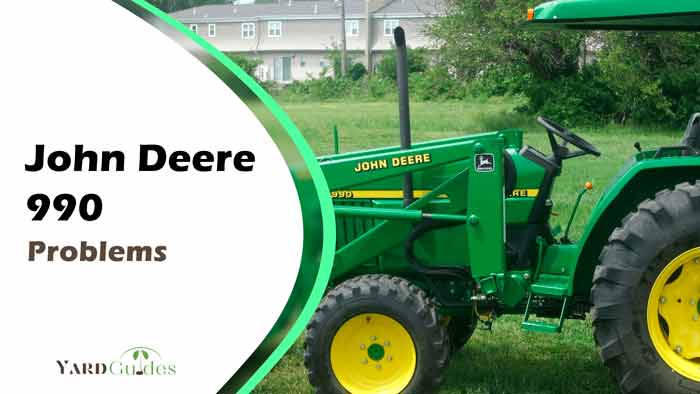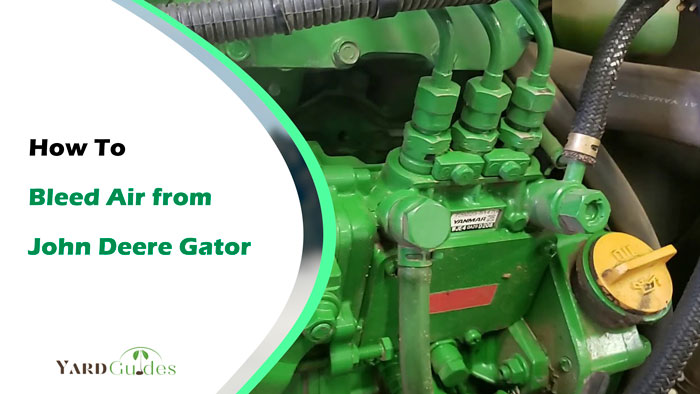Popular tractors like the John Deere 990 are noted for their dependability and toughness. However, even the most efficient ones occasionally run into issues that can affect their performance.
So, what are the common John Deere 990 problems? Hydraulic system malfunctions, engine overheating, fuel system difficulties, and electrical failures are some of the most often encountered issues.
In this article, we will explore these issues in detail and provide some possible solutions to help you keep your John Deere 990 running smoothly.
Troubleshoot Your John Deere 990 Problems – Our Solutions
Here is a table with the issues summarized that you might face with your John Deere 990:
| Problems | Solutions |
| Hydraulic issues | 1. Check fluid levels 2. Replace filters 3. Repair or replace damaged parts |
| Engine overheating | 1. Check coolant levels and top up if necessary 2. Inspect the radiator and hoses for damage 3. Replace the thermostat if needed |
| Fuel system issues | 1. Replace filters 2. Clean injectors 3. Repair or replace the fuel pump |
| Electrical problems | 1. Check battery voltage and alternator charging 2. Replace blown fuses 3. Ensure proper grounding 4. Inspect starter motor for wear |
It’s always a good idea to check the owner’s manual or to consult a professional mechanic for guidance on proper maintenance and repair procedures. And identifying the problems tractors face and solving them is a thorough process that you should know in detail.
Let’s discuss the above problems and solutions in detail now.
1. Hydraulic Problems
Among the most typical troubles that John Deere 990 owners encounter are hydraulic-related complications. These issues can be quite disruptive and expensive to fix.
Causes
- Low or Contaminated Hydraulic Fluid
- Damaged or leaking hydraulic hoses
- Malfunctioning Hydraulic Pump
- Blocked hydraulic filters restrict the flow of hydraulic fluid
- Outdated Hydraulic Parts
- Lack of proper maintenance
Symptoms
Let us know what types of problems you might face in the Hydraulic system.
- Slow operation and Low pressure, Weak or sluggish movement of equipment
- Puddles of hydraulic fluid on the ground, Low hydraulic fluid levels in the reservoir, Hissing sound
- Burning smell, High-temperature gauge readings
Solutions
There are often several underlying factors that must be eliminated before a correct diagnosis is made in cases of hydraulic failure.
- Make sure the hydraulic fluid is at the proper level and add more if necessary
- Change the hydraulic filters regularly as part of routine maintenance to avoid dirty or clogged filters
- Replace hydraulic lines and fittings, hydraulic pumps, relief valves, and hydraulic cylinder seals if you detect any leakage
- Clean the hydraulic system cooling components such as radiators, heat exchangers, and oil coolers and ensure proper ventilation
- Check for loose connections and tighten them
Prevention
To avoid hydraulic issues, preventative maintenance is essential. Here are some tips:
- Ensure routine inspections for leaks and checks on the fluid level to identify problems before they escalate
- Regular maintenance should be performed as per the manufacturer’s instructions
There are a lot of ways you can manage the maintenance of your tractor effectively.
2. Engine Overheating
John Deere 990 owners often have to deal with the problem of their engine overheating. The engine and other parts of the tractor might be severely damaged by overheating, resulting in costly repairs.
Causes
An overheated engine can be caused by a number of factors.
- Insufficient coolant
- Broken cooling system
- Broken fan
- Clogged air filter
Symptoms
- Alarmingly high engine temperature, steam emission, and coolant leakage
- Always high reading on the temperature gauge
- Engine overheating at slow speeds, and unusual noise production
- Reduced engine power, engine misfires or stalls
Solutions
Maintaining the tractor in a regular basis will keep the engine from overheating.
- Change the coolant and water pump if you find leakage in the cooling system
- Make sure the coolant is at the right level, and replace the water pump if it wears out
- Replace the thermostat for proper operation and change a broken radiator or hoses in the cooling system
- Check the fan and its connections for damage, replace the fan if there is any damage detected
- Airflow to the engine should also be ensured by keeping the air filter clean and clear of dirt.
There are many ways you can detect the system failures of engines and smarter ways to solve them.
3. Fuel System Problems
The John Deere 990 tractor’s fuel system is a crucial part for ensuring good engine performance. Let’s have a look at the causes, symptoms and solutions for this problem.
Causes
The points below are the primary causes of fuel system issues.
- A clogged fuel filter
- Over time, the gasoline filter may fill up with dirt and debris
- A malfunctioning fuel pump, problematic fuel injectors, or contaminated fuel are further potential reasons for fuel system troubles
Symptoms
The symptoms are discussed below-
- Engine misfires
- Poor acceleration
- Low fuel efficiency
- Stalling
Fixes
Let’s see how you can fix it:
- Check the gasoline filter and fuel pump
- Replace it if necessary
- If these problems arise, a qualified mechanic should be contacted to identify and resolve the issue.
Also, take a look at this video on why your tractor is starving for fuel.
Fuel System Issues: Maintenance
The John Deere 990 tractor’s fuel system can experience issues that can be avoided with routine maintenance. This includes –
- Using high-quality fuel to avoid contamination
- Maintaining a clean fuel tank
- Changing the fuel filter as directed by the manufacturer
- The fuel pump and injectors should also be frequently checked to make sure they are operating properly
4. Electrical Problems
Recent tractors, such as the John Deere 990, are loaded with electrical parts. A clear idea about the electrical drives of tractors to have a better understanding of the problems is necessary. Several typical electrical issues and their manifestations are listed below.
Causes & Symptoms
- Low charge/Dead battery: Low charge or dead battery to the electronic systems leads to dim headlights, weak horns, and trouble in powering up.
- Faulty alternator: The alternator is crucial for charging the battery when the vehicle is running. A dead battery is the result of an insufficient charge from the alternator.
- Blown fuses: Fuses are meant to break the circuit when there is an electrical overload, protecting the electrical system. As soon as a fuse blows, all electricity is cut off.
- Bad starter motor: The starter motor transforms the engine whenever the ignition key is turned. If the starting motor is broken, the car won’t start.
Solutions
- Make sure the battery is fully charged by measuring its voltage. Use a multimeter to check the voltage of the battery. If it’s less than 12 volts, the battery is likely dead and needs to be charged or replaced.
However, try jump-starting or charging the battery before deciding to replace it.
- Make sure the alternator is working properly by checking its ability to charge the battery. If your John Deere 990 alternator needs repair or replacement, do accordingly.
Replacing bearings or brushes may fix the alternator. Consider the alternator’s age, cost, and availability of spares before considering whether to repair or replace it. Alternators that fail due to manufacturing defects may be covered under warranty.
- If a fuse blows, replace it with one of the same amperages.
- Look for deterioration in the starting motor. If found, you will need to either repair or replace it. The technician may replace brushes, bearings, and corroded contacts if the motor can be fixed.
Maintenance
It includes –
- Keeping the battery terminals clean on a regular basis will keep them free of corrosion
- Maintaining a charged battery
- Alternator belt replacement at suggested service intervals
- Avoiding water damage by keeping electronics dry
Conclusion
The John Deere 990 is an effective and dependable tractor, but it is not invincible. Problems with the hydraulics, the engine overheating, the fuel system, and the electricity are all very common. Check this post to learn the signs of these issues, what triggers them, and how to identify and solve them.
Routine fluid checks, filter inspections, and mechanical part lubrication help maintain a healthy John Deere 990. And to maintain a tractor requires top-notch maintenance supplies and replacement components. However, if you can’t fix them, consult an experienced mechanic.



